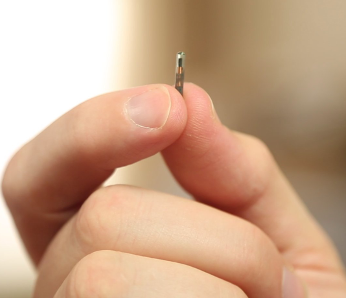Tech company implants microchips into employees' skin
RFID chips are installed under the skin and allow people to open secure doors - and use the copy machine.
A US tech company says it is to become the first firm in the country to implant microchips in its employees.
Three Square Market (32M), which designs software for break room markets, says the Radio-Frequency Identification (RFID) chips will be placed under its workers' skin between the thumb and forefinger.
Using the same NFC technology found in contactless credit cards and smartphones, they will allow employees to pay for food and drink in the company's break room, open secure doors, log in to computers and use the copy machine with just a swipe of the hand.
The microchips – about the size of a grain of rice – could also in the future be used to hold medical records, business cards and payment for other goods and services.
"Eventually, this technology will become standardised allowing you to use this as your passport, public transit, all purchasing opportunities, etc." 32M CEO Todd Westby said in a press release on Thursday (20 July).
The firm stressed that the initiative would be optional for its employees and would not be used for nefarious means like GPS tracking.
It said it expects 50 staff to take part when it begins implementation on 1 August during a "chip party" at its headquarters in River Falls, on the outskirts of Minneapolis.
Each chip costs $300 (£230, €260) and the company says it will pay for them.
32M COO Patrick McMullan said inspiration for the project came from Europe, where they discovered chipped employees at a Sweden-based tech company.
"Europe is far more advanced in mobile and chip technology usage than the U.S. and we are thrilled with the growth opportunity this enhancement will bring to us," he said.
"We see this as another payment and identification option that not only can be used in our markets but our other self-checkout / self-service applications that we are now deploying which include convenience stores and fitness centers."
The company said the data kept on the chips is both encrypted and secure, and that "there's no GPS tracking at all".
The amount of metal in the chip is so small, there is also no risk of it setting off metal detectors.

© Copyright IBTimes 2025. All rights reserved.






















